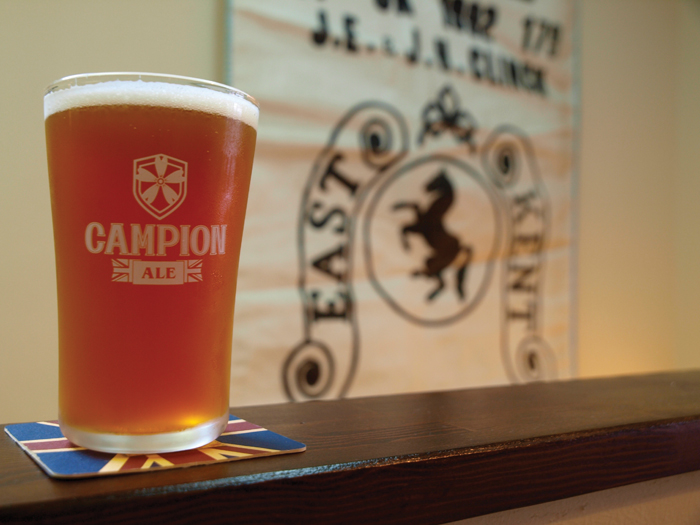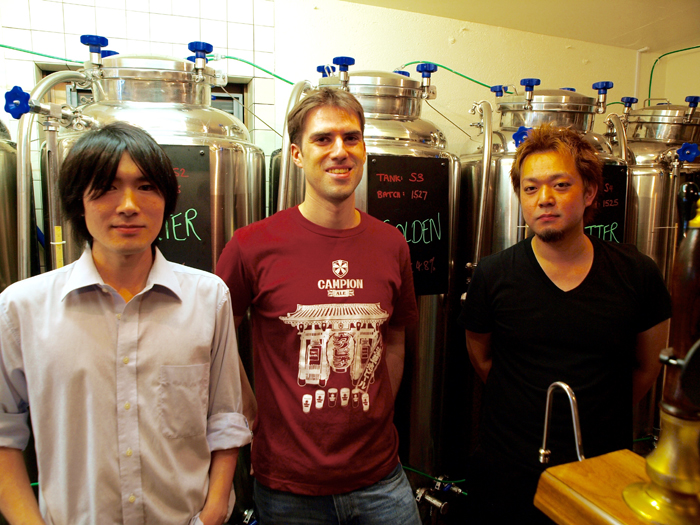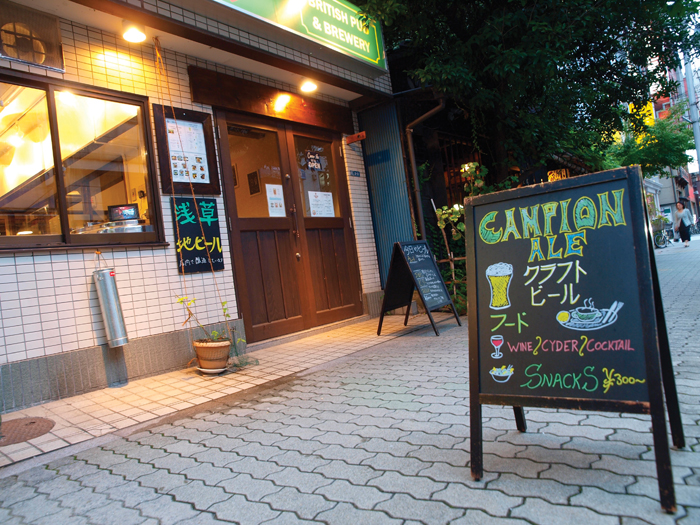Is it possible for a non-Japanese individual to launch a brewpub in Tokyo entirely on his or her own? Forget Tokyo–how about anywhere in Japan? No local business partner, no Japanese spouse, no bank loans–just confidence in a plan and a can-do attitude. When James Williams opened Campion Ales in December of 2013, he didn’t set out to prove that this was possible, but has succeeded in doing so. He built the business himself, bankrolling it entirely with his own savings. Quite impressive for a foreign resident with no experience running any business, let alone starting a brewpub from scratch in Japan.
Raised in Surrey in the UK, Williams attended Cambridge University where he studied mathematics. He worked as a financial consultant in London for a few years and eventually became a certified actuary, a skill that he still uses to do part-time consulting for extra cash. Williams’ mathematically wired brain may be his strongest advantage. It seems to have helped him significantly in the construction of his business model. You can see him working the numbers in his head when he talks finances. He meticulously calculates all the risks and benefits and then determines a probability of success on which to base a decision.
How did the decision to open a brewpub in Japan come about? Succumbing to that Tolkien-like wanderlust that seems inherent in most people from that small North Sea island with worldly aspirations, Williams opted to take a “gap year” after university to travel. During that time, he spent a month in Japan visiting a couple friends who were teaching English through the JET Program. He took a liking to the country and filed a plan for a return trip in the back of his mind. With the time to get serious about a career looming, he returned to the UK after his year of travel to begin financial consulting.
After a few years on the job, he passed all the brutal testing that was required for his actuary certification. The road called to him once again and in 2008 he decided to try living in Japan. During that travel year after university, he also spent six months in Tanzania, volunteering as a “kind of English teacher”. He even summited Kilimanjaro while there, a feat that undoubtedly required a solid bit of human perseverance. His teaching experience in Africa provided him an opportunity in Japan and he decided to apply to the JET Program to teach English. After acceptance, he found himself dispatched to the countryside of Yamagata in the town of Yuzamachi.
While he loved living in Yamagata, the work was too quiet for his tastes. It did, at least, provide time to study Japanese. In 2009 he found a consulting job that brought him to Tokyo and back into the actuary world. After a few years, he realized that he enjoyed life in Tokyo and was happy to prolong his time there. Restless with his job, though, he considered going out on his own.
A beer-related endeavour slowly developed in his mind. Williams recounts, “I thought about UK beer and pub culture more when I came to Japan. When I went to the izakaya and there’s one draft beer on tap, I realized how much I missed that culture of having lots of different beers and local breweries.” In Yamagata he didn’t bemoan the lack of choice because he wasn’t expecting to find diversity in the Japanese countryside, but after relocating to Tokyo, where one would expect to find pretty much anything, he found it a bit shocking that it was so hard to find a decent pint of beer.
For a while he considered running a classic pub, but thought incorporating the brewing process would make it more interesting. The challenge of both setting everything up and also running the business excited him. About four or five years ago he noticed that the craft beer scene in Tokyo was starting to pick up some serious steam and it seemed like a promising venture.
It disappointed Williams that in the growing craft beer scene, “British styles were underrepresented.” Japan’s brewing history is predominantly German-based and traditional German beers still account for a large portion of the beer culture. With Belgian styles having broken into the market early on and American influences taking hold in recent years, he saw an opportunity to bring a British-style pub to the Tokyo masses.
Around the time he was pondering his plans, he happened on a brewpub that provided a model: Beer Kobo. Owner and operator, Nomura Kakyu, had demonstrated to Williams that the brewpub model could succeed in Tokyo. Nomura, who himself had left his job as an ad executive to start his brewpub (now pubs), also offered a living example of what Williams wanted to do.
Believing he could pull off the same, Williams returned to the UK to enroll in a three month brewing course at Brewlab in Sunderland. He had previously homebrewed and had enough basic knowledge to understand the process, but wanted to know the detailed science involved and to receive professional brewing guidance. On returning to Japan with a more focused idea of his business, he began researching the procedure for obtaining a brewing license and the specifics of the equipment he was going to need.
He selected the Asakusa area “partly by choice and partly by price.” Outside of central Tokyo was the only affordable option for a building with enough space to be a pub and also house a small brewing area. The east side of Tokyo was somewhat cheaper. Williams was also fond of the Asakusa area. He relates, “When I explored this slightly off-the-main-track area, I really liked the downtown feel and at the moment there wasn’t really much in the way of other pubs or craft beer places nearby. I thought I could add something a bit interesting mixed in with the traditional.”
Campion was the first name of one of Williams’ ancestors back in the early 1800s. A letter from that original Campion written in 1833 actually hangs on the wall of the bar. The name has been passed on through subsequent generations of the family as a first or middle name all the way down to James Campion Williams. If you’re going to create a traditional brewpub, what better way to start than by backing it with nearly 200 years of family tradition? The flower that appears in the pub’s insignia is also, fittingly, a campion.
Williams was going to need some support to operate the establishment and he enlisted the help of Kuroda Joji through a friend’s introduction. Kuroda had gotten into the craft beer business at Yokohama Brewery, initially doing the grunt work of cleaning tanks, labeling bottles and other various “fun” tasks. He then moved on to Yokohama Bay Brewing where he brewed under the tutelage of Suzuki Shinya (see story on pg 19).
When the two men finally opened the doors to the pub, they only served a bitter and a porter. Those beers are now regulars, in keeping with Williams’ original plan. Currently, the four or five beers served at Campion are brewed on site and come straight out of their five tanks. Williams says he shoots for “a good range in color”. Beyond the bitter and porter, he has filled out the color spectrum with a golden or malty British style wheat, a red ale, a brown ale, a stout, a British IPA (a bit more hoppy and bitter with a little more alcohol than average), a strong ale, a mild (3.1% abv) and, more recently, a cherry ale using cherries from an old friend in Yamagata. When asked about the naming system, Williams says likes to keep it simple. Because he isn’t selling his beer elsewhere, he doesn’t feel the need for any kind of branding and, according to Williams, “the styles speak for themselves.”
Those who’ve had their fill of hopped-up American IPAs or experimental brews like imperial vanilla pineapple porters might want to experience Campion’s traditional British brewpub approach. They also have “Brewing Observation” days every couple months for neophytes who want to watch and learn more about how to convert grains to that frothy beverage that we all love so much. Williams explains, “For me the most fun thing about brewing is turning a sack of malt into some kind of sweet liquid that you can ferment into beer. It’s an amazing process and I think if you’ve never gotten up close with the ingredients before, connecting with them and realizing, oh, this is what beer is made from, it’s quite an interesting thing to see.”
The food menu also started off very simple, limited to what Williams, who had no experience in the restaurant business, could cook. The need for a kitchen pro quickly arose and Hamasaki Hiroyuki entered the picture in January 2015. “Hiro” spent four years in the UK, with two of those dedicated to learning the business of a British pub. He has introduced mashed peas to the menu and typically uses porter in their winter stew and bitter in their fish batter recipes. The trio of Williams, Kuroda and Hamasaki now form the core of the brewpub.
Campion has evolved to where the operations can run without Williams, allowing him to get out from behind the bar and do more organizing and planning. When asked how his newest career sits with him, Williams responds, “It’s good. It’s a very practical career–very different from the office life. I think a brewpub is great because you see the whole process. You’re making the beer and actually see it in the customers’ glass.”
Campion brewed about 12,000L last year and may slightly increase that number this year. Williams says he isn’t thinking of expanding in the near future, but one gets a sense that he will at some point get the itch to try something else. Maybe brew on a larger scale and sell outside of the pub? Maybe open a second place? We’ll just have to wait and see. One thing is clear, though: it will be a well-planned idea and few should doubt Williams’ ability to pull it off.
This article was published in Japan Beer Times # () and is among the limited content available online. Order your copy through our online shop or download the digital version from the iTunes store to access the full contents of this issue.






